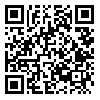Volume 12, Issue 1 (Winter 2023)
Arch Hyg Sci 2023, 12(1): 12-20 |
Back to browse issues page
Download citation:
BibTeX | RIS | EndNote | Medlars | ProCite | Reference Manager | RefWorks
Send citation to:



BibTeX | RIS | EndNote | Medlars | ProCite | Reference Manager | RefWorks
Send citation to:
Deldadeh Mehraban, Farhangi A, Abolghasemi S. Mediating Role of Coping Strategies and Defense Mechanisms in Relationship of Mental Health, Resilience, and Perceived Social Support with Posttraumatic Growth in COVID-19 Survivors. Arch Hyg Sci 2023; 12 (1) :12-20
URL: http://jhygiene.muq.ac.ir/article-1-606-en.html
URL: http://jhygiene.muq.ac.ir/article-1-606-en.html
1- Department of Psychology, Tonekabon Branch, Islamic Azad University, Tonekabon, Iran
Abstract: (763 Views)
Background & Aims: Posttraumatic growth (PTG) refers to positive changes resulting from trauma. As a traumatic stressor, COVID-19 can affect various aspects of one’s life. The present study aimed to investigate the mediating role of coping strategies and defense mechanisms in the relationship of PTG and mental health, resilience, and perceived social support in COVID-19 survivors.
Materials and Methods: This study was conducted using a path analysis method from the correlation matrix. The research population included all COVID-19 recovered patients in Golestan province, Iran. Using the convenience sampling method, 300 patients who recovered from COVID-19 were selected. The participants were given questionnaires online. The research instruments included the Posttraumatic Growth Inventory (PTGI), the General Health Questionnaire (GHQ-28), the Multidimensional Scale of Perceived Social Support (MSPSS), Connor-Davidson Resilience Scale (CD-RISC), the Defense Style Questionnaire (DSQ), and the Ways of Coping Questionnaire (WOC). The data were analyzed through structural equation modeling (SEM) using SPSS and AMOS version 25.
Results: The findings of SEM revealed that the model fits the data. The relationship between problem-focused coping strategies and PTG, mental health, and perceived social support, the relationship between PTG and perceived social support, resilience, and mental health, and the relationship between mature defense mechanisms and PTG, mental health, resilience, and perceived social support were positive and significant (P < 0.01). The relationship between emotion-focused strategies and PTG, resilience, and perceived social support, the relationship between neurotic defense mechanisms and mental health, resilience, PTG, and perceived social support, and the relationship between immature defense mechanisms and mental health, resilience, and PTG were negative and significant (P < 0.01). Furthermore, the direct path analysis revealed that the relationships between mental health and emotion-focused strategies and between perceived social support and immature defense mechanisms were not significant.
Conclusion: The study results suggested that mental health, resilience, perceived social support, as well as problem-focused coping strategies played a crucial role in increasing PTG in COVID-19 patients. Therefore, they can be utilized to reduce the mental damage caused by the COVID-19 pandemic.
Materials and Methods: This study was conducted using a path analysis method from the correlation matrix. The research population included all COVID-19 recovered patients in Golestan province, Iran. Using the convenience sampling method, 300 patients who recovered from COVID-19 were selected. The participants were given questionnaires online. The research instruments included the Posttraumatic Growth Inventory (PTGI), the General Health Questionnaire (GHQ-28), the Multidimensional Scale of Perceived Social Support (MSPSS), Connor-Davidson Resilience Scale (CD-RISC), the Defense Style Questionnaire (DSQ), and the Ways of Coping Questionnaire (WOC). The data were analyzed through structural equation modeling (SEM) using SPSS and AMOS version 25.
Results: The findings of SEM revealed that the model fits the data. The relationship between problem-focused coping strategies and PTG, mental health, and perceived social support, the relationship between PTG and perceived social support, resilience, and mental health, and the relationship between mature defense mechanisms and PTG, mental health, resilience, and perceived social support were positive and significant (P < 0.01). The relationship between emotion-focused strategies and PTG, resilience, and perceived social support, the relationship between neurotic defense mechanisms and mental health, resilience, PTG, and perceived social support, and the relationship between immature defense mechanisms and mental health, resilience, and PTG were negative and significant (P < 0.01). Furthermore, the direct path analysis revealed that the relationships between mental health and emotion-focused strategies and between perceived social support and immature defense mechanisms were not significant.
Conclusion: The study results suggested that mental health, resilience, perceived social support, as well as problem-focused coping strategies played a crucial role in increasing PTG in COVID-19 patients. Therefore, they can be utilized to reduce the mental damage caused by the COVID-19 pandemic.
Keywords: Posttraumatic growth, Psychological support, Social support, Acclimatization, Resilience, Defense mechanisms, COVID-19
Type of Study: Original Article |
Subject:
Occuptional Health
Received: 2022/04/22 | Accepted: 2022/06/19 | Published: 2023/03/30
Received: 2022/04/22 | Accepted: 2022/06/19 | Published: 2023/03/30
Send email to the article author
| Rights and permissions | |
 |
This work is licensed under a Creative Commons Attribution-NonCommercial 4.0 International License. |









